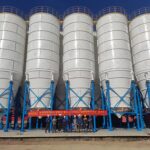The Essential Guide to Commercial Kitchen Professional Deep Cleaning for Restaurants
The Essential Guide
 Maintaining a clean and sanitary kitchen is paramount for the success of any restaurant. Beyond regular cleaning routines, commercial kitchens require professional deep cleaning to ensure the highest standards of hygiene, compliance with regulations, and the longevity of equipment. In this guide, we’ll explore the importance of professional deep cleaning for restaurants and outline the key steps involved.
Maintaining a clean and sanitary kitchen is paramount for the success of any restaurant. Beyond regular cleaning routines, commercial kitchens require professional deep cleaning to ensure the highest standards of hygiene, compliance with regulations, and the longevity of equipment. In this guide, we’ll explore the importance of professional deep cleaning for restaurants and outline the key steps involved.
Importance of Professional Deep Cleaning
1. Health and Safety Compliance: Adhering to health and safety regulations is crucial for restaurants. Professional deep cleaning ensures compliance with local health department standards, protecting both customers and staff from potential health hazards.
2. Enhanced Food Safety: A deep-cleaned kitchen reduces the risk of cross-contamination and the spread of food borne illnesses. Thorough cleaning of surfaces, utensils, and equipment minimizes the chances of bacterial growth and ensures the safety of the food being prepared.
3. Equipment Longevity: Commercial kitchen equipment is a significant investment. Regular deep cleaning helps prevent the buildup of grease and debris, extending the lifespan of appliances and reducing the need for costly repairs or replacements.
Key Steps in Professional Deep Cleaning
1. Preparation: Before deep cleaning, the kitchen should be properly prepared. This involves removing all equipment and movable items, covering sensitive electronics, and securing gas lines. This preparation ensures a thorough and safe cleaning process.
2. Degreasing Surfaces: Grease buildup is a common issue in commercial kitchens. Professional deep cleaning involves the use of specialized degreasers to break down and remove stubborn grease from surfaces, hoods, ducts, and exhaust fans.
3. Cleaning and Sanitizing Equipment: Each piece of equipment, including ovens, grills, fryers, and refrigerators, should undergo a detailed cleaning process. This includes disassembly, cleaning, sanitizing, and reassembly to ensure every part is free from dirt and bacteria.
4. Ventilation and Ductwork: Ventilation systems and ductwork can accumulate grease and debris over time. Professional deep cleaning addresses these areas to improve air quality, maintain proper airflow, and reduce the risk of fire hazards.
5. Floor and Wall Cleaning: Floors and walls in a commercial kitchen are exposed to spills and splatters daily. Deep cleaning involves thorough scrubbing, sanitizing, and ensuring that every corner is free from dirt and grime.
6. Pest Control: A clean kitchen is less attractive to pests. Professional deep cleaning includes measures to prevent and eliminate pest infestations, protecting the restaurant’s reputation and ensuring a hygienic environment.
Conclusion
Investing in professional deep cleaning for a commercial kitchen is a proactive step towards maintaining a safe, efficient, and compliant food preparation space. By prioritizing cleanliness, restaurants not only ensure the well-being of their customers but also contribute to the longevity of equipment and the overall success of the establishment. Regular deep cleaning should be viewed as an integral part of a restaurant’s commitment to quality and safety.




